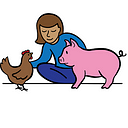What a wonderful world when we don’t have to worry about nature
This video is, in a way, lovely. I like that it cheers people up. I enjoy the beautiful images shared throughout the clip — yet it’s definitely not a perspective I share.
Nature can be awful for an enormous number of individual, sentient animals. It’s only a wonderful world for the relatively few of us who can benefit from progress so we don’t have to suffer nature.
I love enthusiasm and I love positive messages but I think that these “nature is wonderful” messages reflect a perspective of privilege. (1)
I love positive and enthusiastic messages, such as examples of how we have managed to reduce extreme poverty in the last decades, how we live longer, have eradicated several diseases, can restore people’s sight, or how laws are slowly changing for the better for the animals thanks to progress and the excellent work of advocates.
I also do find “natural” places very beautiful to the eye and enjoyable to visit.
And for sure, I would rather be a field mouse than a broiler chicken.
I take animals into consideration, as individuals, because I care for their well-being. I cannot simply switch off this perspective when the cause of an animal’s suffering may be perceived as “natural”. For the bird who is killed, it doesn’t really make a difference if the killer is a human or a non-human animal or if the cause of their death is “natural” or “unnatural”. When it comes to humans who are suffering, we don’t pause to think whether their suffering is natural or not before we decide if they’re worth helping, and I believe we should apply this perspective to non-human animals as well.
Now, a lot of the time, there is not much we can do. But, in my eyes, that doesn’t mean that we must ignore the importance of wild animal suffering altogether.
And before you start thinking that I am suggesting something that is too far-fetched, dangerous and inconceivable, I have to say that of course, I don’t think that we should interfere if there is a reasonable chance that our actions will result in more sentient animals suffering as a consequence.
I will say this again, because it matters a lot to me: I am not suggesting we systematically “help” individual animals in nature if we have no idea what we are doing. If it is likely that the consequences (starvation of many, other animals being killed instead) will be worse if we interfere, then we should not interfere. If we do not fully understand the ramifications of our actions on the eco-system, then we should not interfere. However, as we progress further with scientific research into this area, we will know more and more about the impact of our actions, and may get to the point where wider human intervention to assist wild animals is a realistic concept.
In the meantime, let us stay clear of appeal to nature fallacies, and let us expand our concern to all who suffer.
A wonderful world it can be — thanks to science and technology and the benevolent ways we can use them to help ourselves and others to enjoy it.
And yes, I know it was a very cute and sweet video I shared at the beginning of this post. I appreciate the loveliness but nature is also like this (warning, graphic footage, au naturel):
(1) — “Privilege is when you think something is not a problem because it’s not a problem to you personally”. How might this apply to nature and wild animals? From our comfortable position, it is easy to find nature beautiful and to anthropomorphise it — saying it’s wise or humble. If we accept to look at the suffering of wild animals, taking individual animals into consideration, it’s not so grand. My intent here is simply to suggest that when we care about animals, we should consider intervening in nature if and when it helps and saves more animals than it hurts or than would otherwise suffer. I am in favour of intervening in a benevolent manner rather than refusing to do anything because “nature” knows best. Just because something, anything, is natural does not mean it’s automatically good or better — we ought to examine the consequences.
